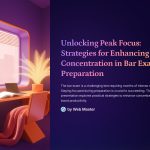 The bar exam is one of the most challenging tests, requiring months of intense study. Staying focused during preparation is crucial for retaining complex legal concepts, mastering case laws, and performing well under pressure. Many aspiring lawyers struggle with distractions, fatigue, and mental exhaustion, which can derail their progress. This guide will provide effective techniques to enhance concentration and boost productivity, ensuring you stay on track for success.
The bar exam is one of the most challenging tests, requiring months of intense study. Staying focused during preparation is crucial for retaining complex legal concepts, mastering case laws, and performing well under pressure. Many aspiring lawyers struggle with distractions, fatigue, and mental exhaustion, which can derail their progress. This guide will provide effective techniques to enhance concentration and boost productivity, ensuring you stay on track for success.

Understanding the Science of Focus
Focus is a cognitive skill that can be strengthened over time. The brain’s ability to concentrate depends on factors like sleep, nutrition, environment, and mental conditioning. Neuroscientific research shows that attention span can be improved by eliminating distractions and engaging in deep work sessions.
One of the key principles of focus is the Pomodoro Technique, where you study for 25–50 minutes followed by a short break. This method helps prevent burnout and keeps the brain engaged. Additionally, maintaining a structured study schedule enhances retention and recall.
Optimizing your study environment is also critical. A clutter-free workspace, proper lighting, and minimal noise distractions contribute to a more focused state of mind. Noise-canceling headphones or classical music can aid concentration by reducing external interruptions.

Effective Time Management Strategies
Time management is essential for bar exam preparation. With a vast syllabus to cover, allocating study hours wisely ensures maximum efficiency. A well-structured study plan should include:
- Prioritization: Focus on high-yield subjects first.
- Time Blocking: Assign specific hours for different topics.
- Breaks & Recovery: Scheduled downtime prevents mental fatigue.
- Practice Tests: Simulate real exam conditions to enhance endurance.
Digital tools like Google Calendar or Notion help track progress and set reminders. Sticking to a timetable creates consistency, which improves retention and minimizes last-minute cramming.

Eliminating Distractions for Deep Work
Distractions are the biggest enemy of concentration. Social media, notifications, and even internal thoughts can break your flow. Implementing the following methods will help maintain deep focus:
- Use App Blockers: Tools like Freedom or Cold Turkey can restrict distractions.
- Set a Dedicated Study Zone: Avoid working in high-traffic areas.
- Follow the 2-Minute Rule: If something takes less than 2 minutes, do it immediately to prevent procrastination.
- Batch Similar Tasks: Group related topics to maintain cognitive consistency.
Developing mindfulness through meditation or breathing exercises can further enhance attention span. Studies indicate that even 10 minutes of daily mindfulness practice improves concentration.

Boosting Mental Stamina and Avoiding Burnout
Long study sessions can lead to mental exhaustion, making it harder to retain information. To sustain focus over months of preparation, consider the following:
- Healthy Diet: Omega-3 fatty acids, green tea, and dark chocolate boost brain function.
- Physical Exercise: Regular movement increases blood flow and cognitive performance.
- Power Naps: A 20-minute nap can significantly improve alertness.
- Hydration: Dehydration impairs cognitive abilities; aim for 2–3 liters of water daily.
Incorporating self-care activities like short walks, stretching, or hobbies helps maintain motivation and prevents burnout.

Enhancing Memory Retention Through Active Learning
Active learning methods are more effective than passive reading. Instead of merely reviewing notes, engage in techniques that reinforce memory:
- Teach Others: Explaining concepts out loud improves understanding.
- Practice Tests: Repeated testing strengthens recall.
- Mind Maps: Visualizing connections helps retain information.
- Mnemonics & Acronyms: Memory aids simplify complex legal principles.
These strategies transform studying from passive absorption into an engaging process, making information easier to recall during the exam.

Conclusion: Achieving Peak Performance
Preparing for the bar exam requires dedication, discipline, and strategic focus. By implementing effective time management, minimizing distractions, prioritizing mental health, and using active learning techniques, you can enhance concentration and optimize performance.
Mastering these focus-enhancing strategies will not only help you pass the bar exam but also set the foundation for a successful legal career.
*Capturing unauthorized images is prohibited*


